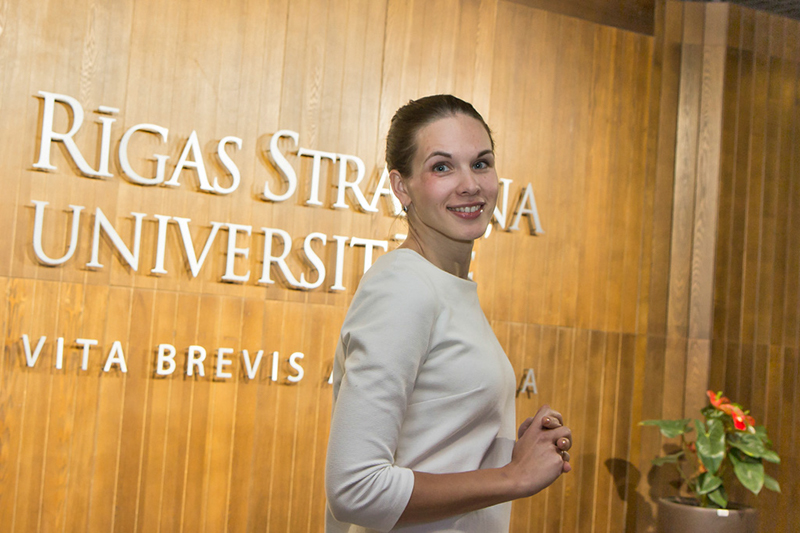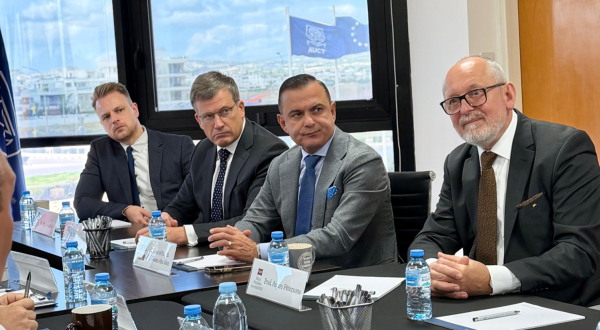Head of the China Studies Centre: Understanding China Crucial To Understanding Russian Attitude to Latvia
China has become one of the most influential powers in the world in recent decades. There are only a handful of experts in Latvia who have excellent command of Chinese and an in-depth knowledge of the culture and politics of the thousand-year-old country. One of them is Una Bērziņa-Čerenkova who is the Head of the China Studies Centre at Rīga Stradiņš University (RSU), Head of the New Silk Road Programme of the Latvian Institute of International Affairs, a lecturer and a Fulbright Scholarship recipient.
The globally influential Foreign Policy Research Institute think tank, which is well known among international relations experts, has recently published Bērziņa-Čerenkova’s second article on the impact of Russian-Chinese relations on Latvia. The article is based on the results and conclusions of a several year’s long study on the relations between the two global powers. Bērziņa-Čerenkova briefly outlined the study, the topicality of its theme and her further academic plans.
‘Ever since 2011, Latvia’s relationship with China has been affected by the so-called Russia factor: decline in transit and a desire to diversify the export market to avoid over-dependence on Russia. Sanctions imposed by the EU was one of the reasons that made the Baltic States look towards China and raise their expectations of the Belt and Road initiative. It was certain that Russian support for China’s transcontinental projects would secure the Baltic States against possible Russian sabotage. The change in attitudes towards China from 2018 and 2019 is also largely connected to Russia – the growing cooperation between Russia and China unsettles observers in Tallinn, Riga, Vilnius, as well as Warsaw. It is therefore essential for the Baltic States to follow the course of Russian-Chinese relations and to develop expertise. Half of the work has already been done – our countries are historically well-informed on Russian foreign and domestic policies. What we need now is a new generation of researchers who are familiar with China in a similar way. And this is what we are working on at RSU.
The latest article is based on a study that was published by the NATO Stratcom Centre of Excellence in cooperation with the Latvian Institute of International Affairs. Official sources were analysed in the original languages (Russian and Chinese), which showed the mutual cooperation narratives of Russia and the People’s Republic of China. I tried to provide an answer to the question of whether the rapprochement between these two Eurasian powers continues.
I am currently working on a book about the relations between China and Russia that is expected to be published by a large international publisher by the end of 2021. The monograph will cover a number of aspects of the relations between both these powers – from official narratives to mutual cooperation and competition in other regions, including in the Arctic. A new study course, based on the publication and the future book, is available to master’s students in the Russian and Eurasian Studies programme. I often have to speak on this topic when I participate in international seminars, of course, which is a great way to practice before working with students at RSU.
The Foreign Policy Research Institute is a prestigious American think tank, which has been ranked as first by The Global Think Tank Index in the category of think tanks whose annual operating budget is less than 5m USD, and The Baltic Bulletin is the think tank’s section dedicated to the Baltic States foreign policy. This is my second publication in this magazine. I submitted my first article on the new role of China in the Baltic States in 2018, and it has become one my articles that has received the most international citations.
For the first publication in 2018, I was recommended as an author by Una Bergmane, an excellent Latvian historian and lecturer at the London School of Economics whose articles in this magazine are among the most read. This is a think tank article, not an academic publication, it is very significant, however, and its results have been cited in Newsweek, Forbes, Quartz and other leading media outlets.'
Una Bērziņa-Čerenkova giving a presentation at the RSU International Student Conference Health and Social Sciences in 2020





